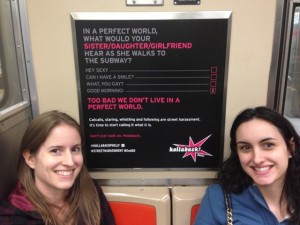By Natasha Vianna, Jan. – June 2013 SSH Blog Correspondents
For a chunk of my adolescence, I genuinely believed that sexual and street harassment were the ultimate forms of flattery. If a guy was willing to whistle, call out nicknames, or harass me, then hey… that must mean I am attractive. And heck, for most of my life, I was told to always appreciate a compliment; so I did.
At the time, part of me enjoyed the harassment because it meant I was sexy or pretty to someone else. In high school, there was an overwhelming pressure to look good, dress well, and “bring all the boys to my yard.” There was jealousy, bitterness, lust, innocence, naivety, and tons of harassment. In fact, by the time I finished my freshmen year of high school, I already believed that if I wasn’t getting attention in the hallways of my school, I was boring and unattractive and needed to do something about it.
The guys in my school were so easily predictable. I knew that if I wore tighter pants or a shorter skirt, I may get a compliment here and there or a stare from the hot football player from across the room. It all seemed like a fun game and I liked having that type of power.
It wasn’t until the harassment quickly shifted from “Hey, you look cute in that shirt” to “You have a fat ass” to “Hey, come and suck my dick bitch,” that I realized I wasn’t enjoying this game anymore. The harassment began to escalate, quickly, and I began to hate walking through the hallways of my high school.
The hot football player would approach me regularly now to see if I wanted to have sex with him. And just like that, he would ask. I’d uncomfortably say no, but it didn’t matter anymore. “So why have you been eyef***ing me from across the room in that short skirt?”
Instead of standing up and shouting, “Because I can wear whatever the f***I want and stare at whomever the f*** I want without wanting to ever f***.” like I would today, I adopted this false belief that what I wear, how I behave, and what I say ultimately determines the treatment I deserve from men. And for years, I worshipped this idealogy.
School became uncomfortable but there was nothing I felt I could do about it anymore. Sexual harassment is rarely addressed in schools the right way. Instead of telling boys to keep their hands to themselves and respect women, girls were told to wear longer skirts and looser clothing. We were blamed when we were mistreated. We were asking for it or just begging for attention.
Here’s an example: My teacher once sent me to the office because my middrift was slightly showing and it was a distraction to the boys in the class. Pissed, I pulled my shirt down and walked down the hallway to meet with the principal. Standing uncomfortably in front of the male principal, who was now looking up and down at me, told to put on a sweater from my locker. For the rest of the day, I covered my 15 year old body in school so the boys could focus on their schoolwork.
When I graduated high school and walked away from those horrible hallways, it didn’t end. The voices of, “Hey baby” and echoes of whistling followed me down many streets… literally. But based on what I endured and learned in high school, I believed this was just normal treatment and how women were supposed to be treated. I trekked on and just tolerated the street harassment never once thinking I was a victim but believing that this is how I would eventually meet my husband.
Thanks to friends and social networking, I was able to talk about (and blog) about my experiences to people who could really help me understand the complexities of harassment. It was an eye-opening, and sometimes painful, experience but one that has changed my life for the better.
Natasha Vianna, a fearless activist and young feminist, is a freelance writer and blogger based out of Boston, MA. Follow her on twitter!

